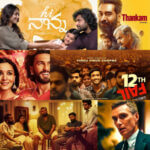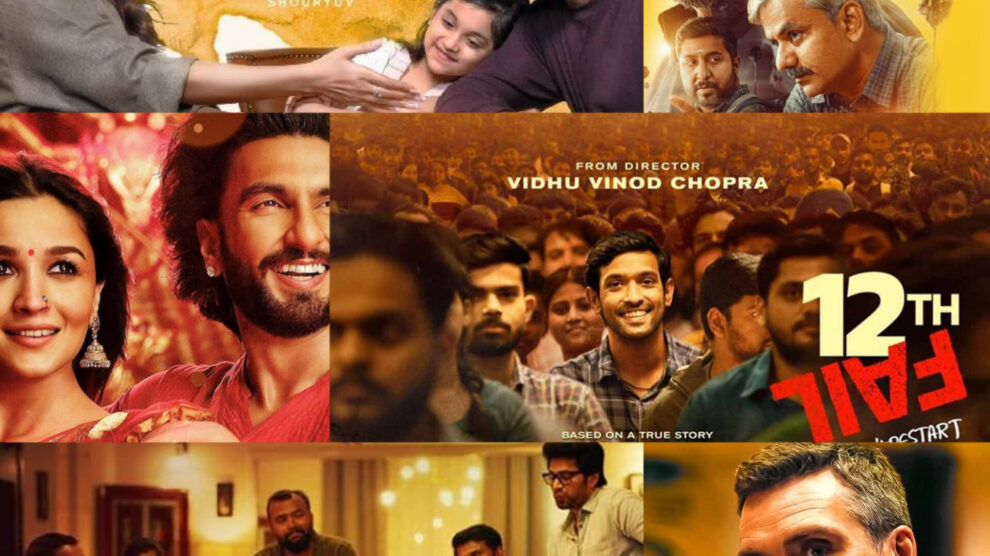Favourite Films of 2023
6. Por Thozhil

A serial-killer thriller that is more a product of profound perception than a frivolous fascination for the genre. Por Thozhil, gladly, borrows from the western classics in the genre and gives an extremely satisfying Indian streak to its messaging. It uses the trope of good cop-bad cop to find the answer to the question that lies at the heart of the film (which is not ‘Who is the killer?’ but ‘Why is the killer?’). The film is technically brilliant, especially the sequence with sound of an approaching train, the edit capturing the shifting dynamics among the characters and performances breathing realism into this technical marvel unfolding over the scene. Its one of those rare Indian thrillers that is crafty and classy in its entirety but what truly marks its genius is the memorable contribution of Late. Sharath Babu. It is so gratifying to see him leave on a note that is of such great value; his character is a fascinating subversion of the age-old red herrings that we are used to in suspense films. The writing of his character gifts him with one of his best roles and he gifts the film with one of his best performances.
5. Jigarthanda DoubleX

Jigarthanda Doublex is a crackling celebration piece of cinema and its unrecognized social incisiveness. Its screenplay is an artichoke of cinematic indulgences of the filmmaker which are so beautifully championed by his execution that you surrender your senses to the grand unfolding of the sprawling emotional and intellectual landscapes of Jigarthanda Doublex. In a desperate turn of events, an ill-fated SI finds himself posing as the assistant of Satyajit Ray who attends to the scouting call of a local Don who wishes to star in a film that’s made on his life. The beauty of Karthik Subbaraj’s style in this film is that it is at the same time a gift to a cinephile and also an invitation to anyone who is not a cinephile. This is his most ambitious film yet, more so because of how emotionally assured it is as opposed to being inventive and intelligent like his previous work. With memories of grief and moments of forgiveness birthing themselves in the womb of a forest, this story becomes an ode to Cinema and more so to its vivacious servants like Karthik Subbaraj.
4. Chithha

Chittha achieves an incredible feat of nurturing deep-rooted sensitivity in the arms of a deceptively simple genre piece. A missing 6-year-old girl is a ‘trope’ in cinema today but S U Arun Kumar along with his collaborator Siddharth put pen to paper and create a world that is filled with complexities of sexuality, intimacy (physical and emotional) and societal norms, while coherently and convincingly tracking its genre beats. Chittha means Uncle and the first act of Chittha is about what transpires psychologically, socially and emotionally when a little girl is abused and her beloved uncle is under suspicion. This 30-minute stretch in the film is an elusive expedition of the peripheries of truth. Perhaps this is the closest Indian mainstream has come to Asghar Farhadi kind of unraveling of the several faces of truth which renders the concept of ‘lies’ irrelevant. This exploration of the utterly impregnable complexity of the situation is some of the most riveting writing and acting I have seen in a long time. Siddharth not only produces this gem of a film but bolsters it’s stunning writing with his career best or perhaps career redefining performance all of which is encapsulated within a moment that punctuates the aforementioned first act; Siddhanth is Absolutely brilliant. There are absolutely no answers in that first half about what or how you should feel. The 30-minute stretch is pregnant with questions and only questions; perhaps a smidgen of empathy.
3. Ponniyin Selvan 2 – (PS2)

In one of the most ingenious choices in modern cinema, Mani Ratnam begins the film with a sweeping 3 song stretch to introduce to us the central conflict of the story – Nandini and Adithya’s relationship. This 10-minute stretch validates Mani Ratnam’s unabashed disdain for convention and positions him as a visionary who serves the gods of cinema with stunning novelty. Mani Ratnam showcases his exquisite sense of framing and staging by capturing dramatic conversations in a way that would render words irrelevant in conveying the shifting dynamics within that conversation. While the first part was a staggeringly assured setup of the world, PS-2 is a relentless adventure drama that surfs from one narrative wave to another until it finally gushes to the shore, climaxing into a literal and metaphoric darkness that eats up the sustained ache of the central conflict – the relationship of Nandini and Adithya. Rahman’s score for both installments is stupendous even with his unearthly standards but the set of songs he has created for PS-2 are for the ages; especially, the symphony of agony – Chinnanjira Nilave. The Original Soundtrack (BGM) of both the parts are so refreshingly fusionistic in their approach. Like Hans Zimmer in the west, Rahman, too, loves using vocals as a part of their OSTs and its this masterful use of vocals and bits of lyrical scores that embellish this sensational soundtrack. While Karthi was the standout performer of PS1, In PS2 it is Vikram who reassures everyone about his beastly ability and Aishwarya Rai Bachchan as Nandini towers over every other actor in this enviable ensemble. She builds an abode of aching flame within her and resists it from bursting out, this restrained fire shifts shapes into various shades of trauma and trickery that sneak through the fascinating shafts of her eyes, creating a treacherous weave of conspiracies that pave path for the grandest of stories to unfold on the canvas of our greatest living filmmaker.
2. Oppenheimer

Famously quoted by one of his own characters “Don’t try to understand it, Feel it.” Nolan’s work was never meant to be understood or even perceived; it was always aimed to make us feel; a feeling that is distinct, addictive, paradoxically simple and sophisticated at the same time. However, in Oppenheimer, Nolan demands you to understand. He trusts his audience to sit through a rat-a-tat of physics and politics, promising a worthy reward. The reward is a call to destruction, a devastating squeal for help, help to be pulled out of the strangling conundrum of creating history while destroying the future of millions.
Nolan’s use of Imax has seldom been more evocative; having an actor who can hold a shot is a blessing for Nolan and he goes all-out in capturing the daunting mental chaos that dances on the face of Cillian Murphy. Ludwig Goransson’s strings attain an unnerving frenzy as Cillian Murphy’s face becomes a canvas for devastation and exhilaration. The way Nolan captures the dichotomy of delight and destitute is going down as one of the greatest cinematic moments in history and that page in history shall be painted in Cillian Murphy’s brilliance!
1. 12TH Fail

12th Fail is a capsule of craftsmanship and the artistry of an old-school soul. It, probably, has the most boring story-line of a good, hardworking boy achieving his noble dream. This cacophony of cliché is given a distinct film-making voice that washes off the cliches and presents to us a story of resilience and sincerity. Vidhu Vinod Chopra is a 70-year-old filmmaker who enters the spirit of a 20-year-old boy and tells the story as if singing a swooning melody of his wounds and wins. The casting of every tiny role in the film is gold standard. A character starts singing in the middle of a mela and the camera lurks closer to her angelic face as the chaos of the market drowns out of the frame while our hearts of filled with magic, thanks to the music, the music as the world knows it and the music of Vinod Chopra, the music of film-making. This scene is only an example of how divinely music is used in this film.
One would fail to find an inch of this film that is not painted in the glory of a sincere visionary. The music, the performances, the editing, the mesmeric camerawork, the writing (dialogue & screenplay) every craft mentioned is home to sincerity towards telling a story. The rigidity of the immaculately grammatical film-making finds its necessary melodic flow in the voice of a storyteller who enjoys telling a story while taking immense pride in how he tells it; and he tells it better than anyone did this year or perhaps in many years!
*****A Gem****
Mirror (Short Film from The Netflix Anthology Lust Stories 2)

Directed by Konkana Sen Sharma, Mirror is a voyeuristic masterpiece about the idea of pleasure and privacy. This film stars Tilothama Shome and Amrita Subhash. Along with the director, this becomes a Trinity to be treasured by our nation. The film is about a middle-aged corporate woman walking into her maid having sex in her bedroom. Yes, it’s as horrific and funny as its sound but to this crass sounding idea Konkana brings a profoundly humane and societal perspective that ends in one of the most sensitively intimate moments of Indian cinema. This film is beyond any ranking be and hence features after my favourite film of the year (12th Fail) proving that any other film that could be made will not match the brilliance of Konkana Sen Sharma’s Mirror.
Special Mentions – Hi Naanna, Thankam, Rocky aur Rani ki Prem Kahaani, 1001 Lies, Saptha Sagaradaache Ello















Add Comment